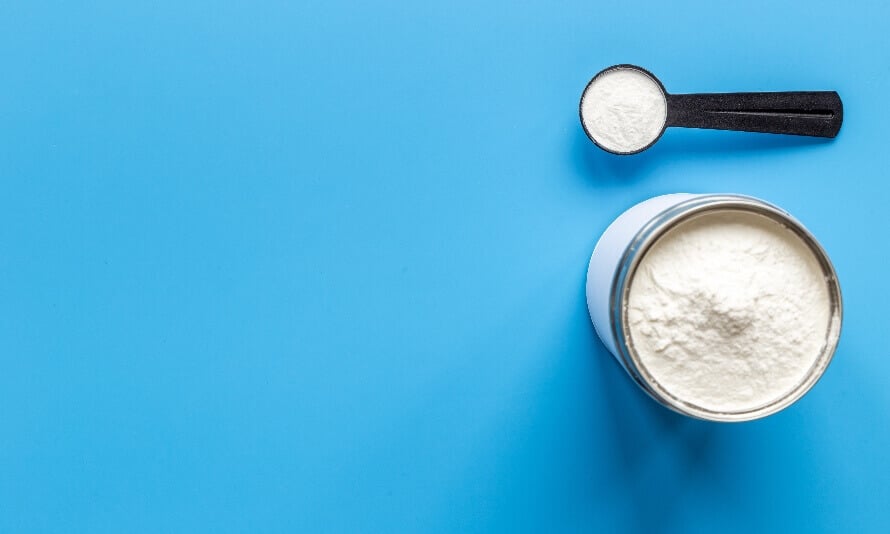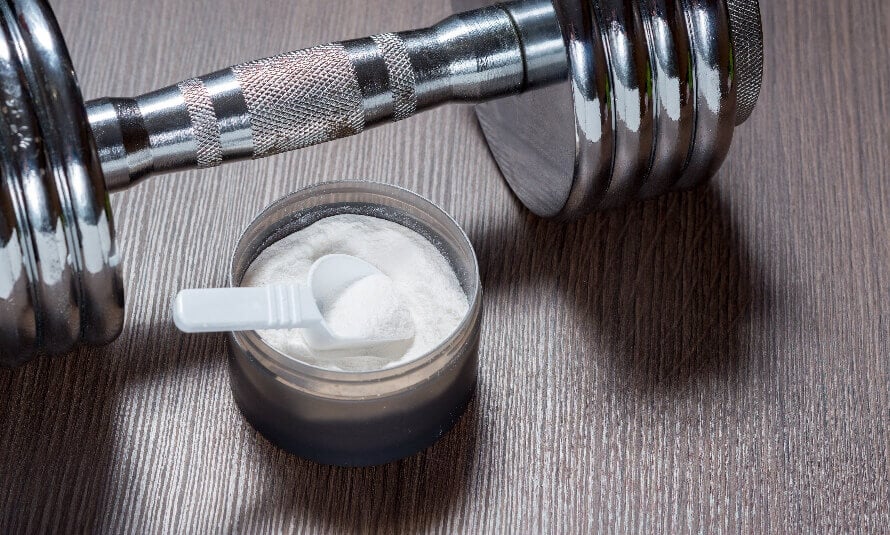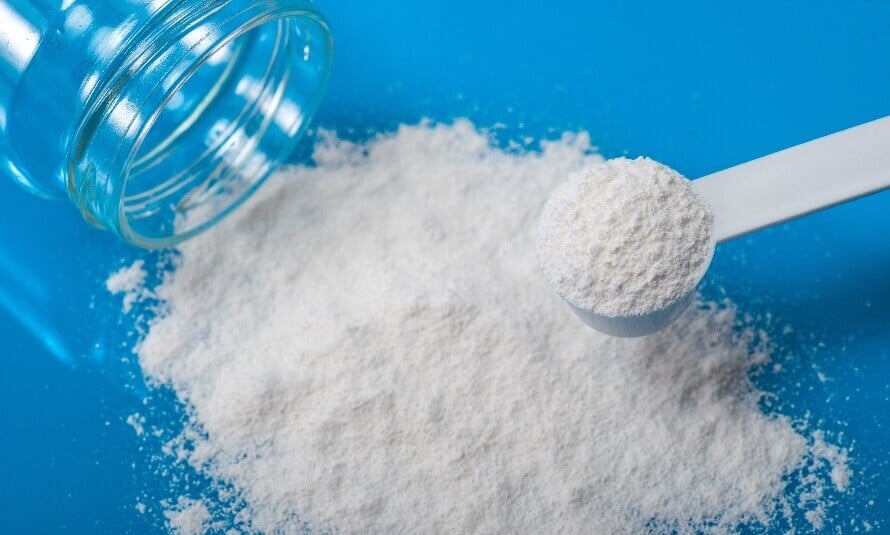In the world of sports supplements, there’s a long-standing debate around creatine HCL vs monohydrate.
Both contenders, HCL creatine and creatine monohydrate, have their loyalists, each swearing by the benefits of their chosen type.
But in studies comparing creatine monohydrate vs HCL, how do these types of creatine differ, what are their pros and cons, and which comes out on top?
The short answer: For most people, creatine monohydrate is the better choice. It’s better-researched, just as effective, and cheaper.
That said, creatine HCL has unique properties that could make it a worthwhile alternative in certain situations.
In this article, you’ll discover the key differences between creatine HCL and monohydrate, weigh their pros and cons, and learn how to choose the best option for your goals.
Key Takeaways
- Despite some marketing claims, research comparing creatine HCL vs. monohydrate shows no clear advantage for HCL, making monohydrate the best choice for most people.
- While creatine HCL dissolves more easily and may reduce bloating, it doesn’t appear to offer better performance benefits than monohydrate.
- Both creatine HCL and monohydrate improve muscle growth and strength, but monohydrate is significantly cheaper for the same results.
- To minimize potential side effects, such as bloating, skip the loading phase and take 3-to-5 grams of monohydrate daily.
Table of Contents
+
What Is Creatine?
Creatine is a natural compound comprising the amino acids L-arginine, glycine, and methionine.
Your body produces creatine naturally, but it can also absorb and store creatine from foods like meat, eggs, and fish.
Creatine accelerates the process that produces adenosine triphosphate (ATP), our cells’ primary energy source.
Taking creatine supplements greatly increases your body’s creatine stores, leading to increased muscle growth, improved strength and power, better anaerobic capacity, reduced fatigue, less muscle damage and soreness after exercise, modified gene expression relating to hypertrophy, and greater muscle retention after grueling workouts.
Creatine HCL vs. Monohydrate: Differences

Creatine monohydrate is creatine bound to one molecule of water (“mono” meaning one and “hydrate” referring to water).
It’s the most well-studied type of creatine available, and research repeatedly shows that creatine monohydrate supplements are safe and boost your athletic performance as much or more than other forms of creatine.
Over the years, manufacturers have modified creatine in various ways in the hopes of making a type of creatine that’s more effective than monohydrate.
Creatine hydrochloride (HCL) is one such type.
HCL creatine is chemically similar to monohydrate, only the creatine molecules bind to hydrochloric acid rather than water.
This distinction gives creatine HCL two potential advantages over monohydrate:
- Improved solubility: HCL creatine is more “soluble” in water (it dissolves more easily) than monohydrate.
- Enhanced absorption: HCL creatine moves through the gut wall more efficiently than monohydrate, optimizing the amount your body uses.
Some believe these potential benefits mean you need less creatine HCL to fill muscle cells, leading to less creatine excretion and stomach discomfort.
Creatine HCL vs. Monohydrate: The Evidence
Three studies support the theoretical benefits of creatine HCL.
However, none involved human participants—scientists studied HCL and monohydrate solubility using lab equipment and assessed absorption using human cells, pig skin, and rat brains.
Given the differences in how various species store and process creatine, it’s uncertain if these findings would translate to living humans. Even if they did, creatine HCL’s benefits might not be as significant as anticipated.
That’s because the few studies that pit creatine monohydrate vs. HCL show they’re similarly effective.
In one study published in the journal Food and Nutrition Sciences, researchers had weightlifters take creatine monohydrate or creatine HCL daily for 4 weeks while following a strength training program.
The results showed that all of the weightlifters gained comparable strength on the bench and leg press, but those who took HCL appeared to lose more fat and gain more “fat-free mass” (a proxy for muscle).
While this might seem like a victory for HCL, two points warrant caution.
First, the researchers determined the weightlifters’ body fat percentage using skinfold calipers, a method known for its inaccuracy. Hence, errors during measuring could easily have caused the changes in body fat percentage.
And second, the study noted that only those taking HCL saw a significant increase in fat-free mass even though the monohydrate group saw a larger increase (3.5 pounds vs. 3.7 pounds), a discrepancy the authors failed to explain.
In a subsequent study by the same research team, athletes taking HCL and monohydrate saw similar increases in lean body mass (another proxy for muscle) and strength, but only those taking HCL saw a decrease in fat.
Again, the scientists used skinfold calipers to determine these changes, which makes it difficult to draw firm conclusions from their findings.
In the last study to compare creatine monohydrate vs. HCL, researchers found that both HCL and monohydrate failed to improve athletic performance and anabolic (“muscle-building”) hormone levels in young men after one week.
These findings are unsurprising considering the time creatine takes to exert its effects and its minimal impact on hormone levels.
Creatine HCL vs. Monohydrate: Pros and Cons

Scientists developed creatine HCL to sidestep monohydrate’s most common side effects: water retention and weight gain.
These side effects typically affect people during a creatine “loading phase,” where you take higher doses for the first week of taking creatine monohydrate to accelerate its accumulation in your muscles.
During this time, your body may retain more water than if you took smaller doses, potentially causing temporary bloating and weight gain.
Because of its chemical composition, HCL creatine is 38 times more soluble than monohydrate and potentially more “bioavailable.” As such, many believe taking HCL helps you avoid adverse side effects since you consume less water and creatine than when supplementing with monohydrate.
While these advantages sound promising, no evidence confirms them in humans, so you should think of them as “potential” rather than “proven” benefits until scientists confirm them with high-quality research.
Another reason not to get too jazzed about these potential “pros” is that loading creatine monohydrate is optional.
If you’re worried about experiencing side effects, you can simply skip the loading phase and take 3-to-5 grams daily instead. This approach may mean you have to wait slightly longer to experience creatine’s performance-enhancing benefits, but it won’t impact its long-term effectiveness.
In other words, there’s no guarantee creatine HCL has any advantages over creatine monohydrate. And even if it does, you can offset these advantages by taking less monohydrate when you begin supplementing.
A major drawback of choosing HCL over monohydrate is the cost.
In a systematic review by the University of Colorado, researchers found that most forms of creatine boost performance to a similar degree, but creatine monohydrate is significantly more affordable. According to their analysis, the average cost of a 5-gram serving of HCL is $1.10.
Meanwhile, a 5-gram serving of monohydrate costs just $0.29.
Creatine HCL vs. Monohydrate: Common Side Effects
As noted earlier, HCL creatine may slightly reduce your risk of water retention, bloating, and temporary weight gain compared to creatine monohydrate.
That said, skipping the loading phase when using monohydrate can also mitigate these side effects.
Aside from these minor and usually short-lived drawbacks, creatine monohydrate and creatine HCL’s side effects are minimal: both are generally safe, even when taking large daily doses (30 grams per day) for several years.
Contrary to what some say, there’s no evidence creatine causes acne, headaches, or high blood pressure. Moreover, it doesn’t disturb sleep, almost certainly doesn’t cause hair loss, and provided you have healthy kidneys, it won’t harm kidney health, either.
Creatine HCL vs. Creatine Monohydrate: Which Is Best?

Research shows that creatine of any kind improves your athletic performance in numerous ways.
However, no type of creatine is as well-studied, safe, cost-effective, and reliable as creatine monohydrate.
Thus, monohydrate is the clear winner in a battle between creatine monohydrate vs. HCL.
For a natural source of creatine monohydrate, try Legion’s micronized creatine monohydrate supplement, creatine gummies, or Recharge
FAQ #1: How much creatine HCL should I take?
The standard creatine HCL dosage is 3-to-5 grams. This dosage is the same as creatine monohydrate, despite some marketing claims suggesting that you can take less creatine HCL because it’s more soluble.
FAQ #2: Does creatine make you bigger?
Yes, both creatine HCL and monohydrate increase the amount of water held in muscle cells, making your muscles appear bigger.
It also positively affects nitrogen balance and the expression of certain genes, which helps you gain size by boosting muscle growth.
FAQ #3: When is the best time to take creatine for muscle gain?
There’s no “best time to take creatine.”
Research shows it works perfectly well when you take it at any time of the day.
FAQ #4: What happens when you stop taking creatine?
The creatine stores in your muscles will gradually deplete, causing your athletic performance to dip.
This doesn’t happen overnight, though.
Provided your muscles are fully saturated when you stop, you can expect to hang onto approximately 80% of your stored creatine for up to 2 weeks, and it’ll take around a month of not taking creatine before your levels return to “baseline.”
FAQ #5: Can you take creatine before bed?
Yes, you can take both creatine HCL and monohydrate before bed.
Creatine isn’t a stimulant, so taking it before bed won’t disturb your sleep.
Creatine may reduce total and deep sleep duration in animals.
While reducing sleep duration and quality usually harms mental and physical performance, other studies show that humans taking creatine are mentally and physically sharper, even when sleep-deprived.
Thus, it’s possible (though highly speculative) that creatine could reduce your need for sleep and counteract the drawbacks of sleep deprivation.
Scientific References +
- Cooper, Robert, et al. “Creatine Supplementation with Specific View to Exercise/Sports Performance: An Update.” Journal of the International Society of Sports Nutrition, vol. 9, no. 1, 20 July 2012, www.ncbi.nlm.nih.gov/pmc/articles/PMC3407788/, https://doi.org/10.1186/1550-2783-9-33.
- Darrabie, Marcus D., et al. “AMPK and Substrate Availability Regulate Creatine Transport in Cultured Cardiomyocytes.” American Journal of Physiology. Endocrinology and Metabolism, vol. 300, no. 5, 1 May 2011, pp. E870-876, pubmed.ncbi.nlm.nih.gov/21364119/, https://doi.org/10.1152/ajpendo.00554.2010. Accessed 23 Dec. 2021.
- Guzun, R., et al. “Systems Bioenergetics of Creatine Kinase Networks: Physiological Roles of Creatine and Phosphocreatine in Regulation of Cardiac Cell Function.” Amino Acids, vol. 40, no. 5, 10 Mar. 2011, pp. 1333–1348, link.springer.com/article/10.1007%2Fs00726-011-0854-x, https://doi.org/10.1007/s00726-011-0854-x. Accessed 18 Nov. 2019.
- McCall, Wesley, and Adam M. Persky. “Pharmacokinetics of Creatine.” Sub-Cellular Biochemistry, vol. 46, 2007, pp. 261–273, pubmed.ncbi.nlm.nih.gov/18652081/. Accessed 18 Oct. 2023.
- Jd, Branch. “Effect of Creatine Supplementation on Body Composition and Performance: A Meta-Analysis.” International Journal of Sport Nutrition and Exercise Metabolism, 1 June 2003, pubmed.ncbi.nlm.nih.gov/12945830/.
- Camic, Clayton L, et al. “The Effects of Polyethylene Glycosylated Creatine Supplementation on Muscular Strength and Power.” Journal of Strength and Conditioning Research, vol. 24, no. 12, Dec. 2010, pp. 3343–3351, https://doi.org/10.1519/jsc.0b013e3181fc5c5c. Accessed 14 Apr. 2019.
- Eckerson, Joan M., et al. “Effect of Creatine Phosphate Supplementation on Anaerobic Working Capacity and Body Weight after Two and Six Days of Loading in Men and Women.” The Journal of Strength and Conditioning Research, vol. 19, no. 4, 2005, p. 756, https://doi.org/10.1519/r-16924.1.
- Anomasiri, Wilai, et al. “Low Dose Creatine Supplementation Enhances Sprint Phase of 400 Meters Swimming Performance.” Journal of the Medical Association of Thailand = Chotmaihet Thangphaet, vol. 87 Suppl 2, 1 Sept. 2004, pp. S228-232, pubmed.ncbi.nlm.nih.gov/16083193/. Accessed 7 July 2021.
- Safdar, Adeel, et al. “Global and Targeted Gene Expression and Protein Content in Skeletal Muscle of Young Men Following Short-Term Creatine Monohydrate Supplementation.” Physiological Genomics, vol. 32, no. 2, Jan. 2008, pp. 219–228, https://doi.org/10.1152/physiolgenomics.00157.2007.
- Tang, Fu-Chun, et al. “Contribution of Creatine to Protein Homeostasis in Athletes after Endurance and Sprint Running.” European Journal of Nutrition, vol. 53, no. 1, 8 Feb. 2013, pp. 61–71, https://doi.org/10.1007/s00394-013-0498-6. Accessed 19 Feb. 2019.
- Kreider, Richard B., et al. “International Society of Sports Nutrition Position Stand: Safety and Efficacy of Creatine Supplementation in Exercise, Sport, and Medicine.” Journal of the International Society of Sports Nutrition, vol. 14, no. 1, 13 June 2017, www.tandfonline.com/doi/full/10.1186/s12970-017-0173-z, https://doi.org/10.1186/s12970-017-0173-z.
- Stockbrugger, Barry A., and Robert G. Haennel. “Contributing Factors to Performance of a Medicine Ball Explosive Power Test: A Comparison between Jump and Nonjump Athletes.” Journal of Strength and Conditioning Research, vol. 17, no. 4, 1 Nov. 2003, pp. 768–774, pubmed.ncbi.nlm.nih.gov/14636108/, https://doi.org/10.1519/1533-4287(2003)0172.0.co;2.
- Gufford, Brandon T., et al. “Physicochemical Characterization of Creatine N-Methylguanidinium Salts.” Journal of Dietary Supplements, vol. 7, no. 3, 1 Sept. 2010, pp. 240–252, pubmed.ncbi.nlm.nih.gov/22432515/, https://doi.org/10.3109/19390211.2010.491507. Accessed 5 Nov. 2020.
- Gufford, Brandon T., et al. “PH-Dependent Stability of Creatine Ethyl Ester: Relevance to Oral Absorption.” Journal of Dietary Supplements, vol. 10, no. 3, 1 Sept. 2013, pp. 241–251, www.ncbi.nlm.nih.gov/pmc/articles/PMC4469200/, https://doi.org/10.3109/19390211.2013.822453. Accessed 10 Nov. 2021.
- Alraddadi, Eman, et al. “Absolute Oral Bioavailability of Creatine Monohydrate in Rats: Debunking a Myth.” Pharmaceutics, vol. 10, no. 1, 8 Mar. 2018, p. 31, https://doi.org/10.3390/pharmaceutics10010031. Accessed 12 May 2021.
- Kreider, Richard B. “Species-Specific Responses to Creatine Supplementation.” American Journal of Physiology-Regulatory, Integrative and Comparative Physiology, vol. 285, no. 4, Oct. 2003, pp. R725–R726, https://doi.org/10.1152/ajpregu.00375.2003. Accessed 26 Oct. 2020.
- França, Elias de, et al. “Creatine HCl and Creatine Monohydrate Improve Strength but Only Creatine HCl Induced Changes on Body Composition in Recreational Weightlifters.” Food and Nutrition Sciences, vol. 06, 2015, p. 1624, www.scirp.org/html/5-2701782_62283.htm#txtF9, https://doi.org/10.4236/fns.2015.617167.
- Fernandes, Caroline, et al. Comparison between Creatine Monohydrate and Creatine HCl on Body Composition and Performance of the Brazilian Olympic Team. 28 Mar. 2019.
- Tayebi, Milad , and Hamid Arazi. Is Creatine Hydrochloride Better than Creatine Monohydrate for the Improvement of Physical Performance and Hormonal Changes in Young Trained Men? Dec. 2019, https://doi.org/10.1016/j.scispo.2019.07.013.
- Bemben, Michael G, and Hugh S Lamont. “Creatine Supplementation and Exercise Performance.” Sports Medicine, vol. 35, no. 2, 2005, pp. 107–125, link.springer.com/article/10.2165/00007256-200535020-00002, https://doi.org/10.2165/00007256-200535020-00002.
- Kutz, Matthew R., and Michael J. Gunter. “Creatine Monohydrate Supplementation on Body Weight and Percent Body Fat.” The Journal of Strength and Conditioning Research, vol. 17, no. 4, 2003, p. 817, https://doi.org/10.1519/1533-4287(2003)017%3C0817:cmsobw%3E2.0.co;2. Accessed 1 Apr. 2019.
- Powers, Michael E., et al. “Creatine Supplementation Increases Total Body Water without Altering Fluid Distribution.” Journal of Athletic Training, vol. 38, no. 1, 2003, pp. 44–50, www.ncbi.nlm.nih.gov/pmc/articles/PMC155510/.
- Hultman, E., et al. “Muscle Creatine Loading in Men.” Journal of Applied Physiology, vol. 81, no. 1, July 1996, pp. 232–237, pubmed.ncbi.nlm.nih.gov/8828669/, https://doi.org/10.1152/jappl.1996.81.1.232.
- Fazio, Carly, et al. “Efficacy of Alternative Forms of Creatine Supplementation on Improving Performance and Body Composition in Healthy Subjects.” Journal of Strength and Conditioning Research, vol. Publish Ahead of Print, 11 Feb. 2021, https://doi.org/10.1519/jsc.0000000000003873. Accessed 10 Nov. 2021.
- Kreider, Richard B., et al. “International Society of Sports Nutrition Position Stand: Safety and Efficacy of Creatine Supplementation in Exercise, Sport, and Medicine.” Journal of the International Society of Sports Nutrition, vol. 14, no. 1, 13 June 2017, pubmed.ncbi.nlm.nih.gov/28615996/, https://doi.org/10.1186/s12970-017-0173-z.
- MIHIC, SASA, et al. “Acute Creatine Loading Increases Fat-Free Mass, but Does Not Affect Blood Pressure, Plasma Creatinine, or CK Activity in Men and Women.” Medicine & Science in Sports & Exercise, vol. 32, no. 2, Feb. 2000, p. 291, https://doi.org/10.1097/00005768-200002000-00007. Accessed 22 Apr. 2020.
- van der Merwe, Johann, et al. “Three Weeks of Creatine Monohydrate Supplementation Affects Dihydrotestosterone to Testosterone Ratio in College-Aged Rugby Players.” Clinical Journal of Sport Medicine, vol. 19, no. 5, Sept. 2009, pp. 399–404, https://doi.org/10.1097/jsm.0b013e3181b8b52f.
- Carvalho, Ana Paula Perillo Ferreira, et al. “Suplementação Com Creatina Associada Ao Treinamento Resistido Não Altera as Funções Renal E Hepática.” Revista Brasileira de Medicina Do Esporte, vol. 17, no. 4, Aug. 2011, pp. 237–241, https://doi.org/10.1590/s1517-86922011000400004. Accessed 4 Jan. 2022.
- Davani-Davari, Dorna, et al. “Potential Adverse Effects of Creatine Supplement on the Kidney in Athletes and Bodybuilders.” Iranian Journal of Kidney Diseases, vol. 12, no. 5, 1 Oct. 2018, pp. 253–260, pubmed.ncbi.nlm.nih.gov/30367015/.
- Parise, G., et al. “Effects of Acute Creatine Monohydrate Supplementation on Leucine Kinetics and Mixed-Muscle Protein Synthesis.” Journal of Applied Physiology, vol. 91, no. 3, 1 Sept. 2001, pp. 1041–1047, https://doi.org/10.1152/jappl.2001.91.3.1041.
- Candow, Darren G., et al. “Strategic Creatine Supplementation and Resistance Training in Healthy Older Adults.” Applied Physiology, Nutrition, and Metabolism, vol. 40, no. 7, July 2015, pp. 689–694, https://doi.org/10.1139/apnm-2014-0498.
- Safdar, Adeel, et al. “Global and Targeted Gene Expression and Protein Content in Skeletal Muscle of Young Men Following Short-Term Creatine Monohydrate Supplementation.” Physiological Genomics, vol. 32, no. 2, Jan. 2008, pp. 219–228, https://doi.org/10.1152/physiolgenomics.00157.2007.
- Dworak, Markus, et al. “Creatine Supplementation Reduces Sleep Need and Homeostatic Sleep Pressure in Rats.” Journal of Sleep Research, vol. 26, no. 3, 11 Apr. 2017, pp. 377–385, https://doi.org/10.1111/jsr.12523. Accessed 10 Dec. 2021.
- McMorris, T., et al. “Effect of Creatine Supplementation and Sleep Deprivation, with Mild Exercise, on Cognitive and Psychomotor Performance, Mood State, and Plasma Concentrations of Catecholamines and Cortisol.” Psychopharmacology, vol. 185, no. 1, 17 Jan. 2006, pp. 93–103, https://doi.org/10.1007/s00213-005-0269-z.
- McMorris, T., et al. “Creatine Supplementation, Sleep Deprivation, Cortisol, Melatonin and Behavior.” Physiology & Behavior, vol. 90, no. 1, Jan. 2007, pp. 21–28, https://doi.org/10.1016/j.physbeh.2006.08.024.
- Cook, Christian J, et al. “Skill Execution and Sleep Deprivation: Effects of Acute Caffeine or Creatine Supplementation - a Randomized Placebo-Controlled Trial.” Journal of the International Society of Sports Nutrition, vol. 8, no. 1, 16 Feb. 2011, https://doi.org/10.1186/1550-2783-8-2. Accessed 17 Feb. 2020.










